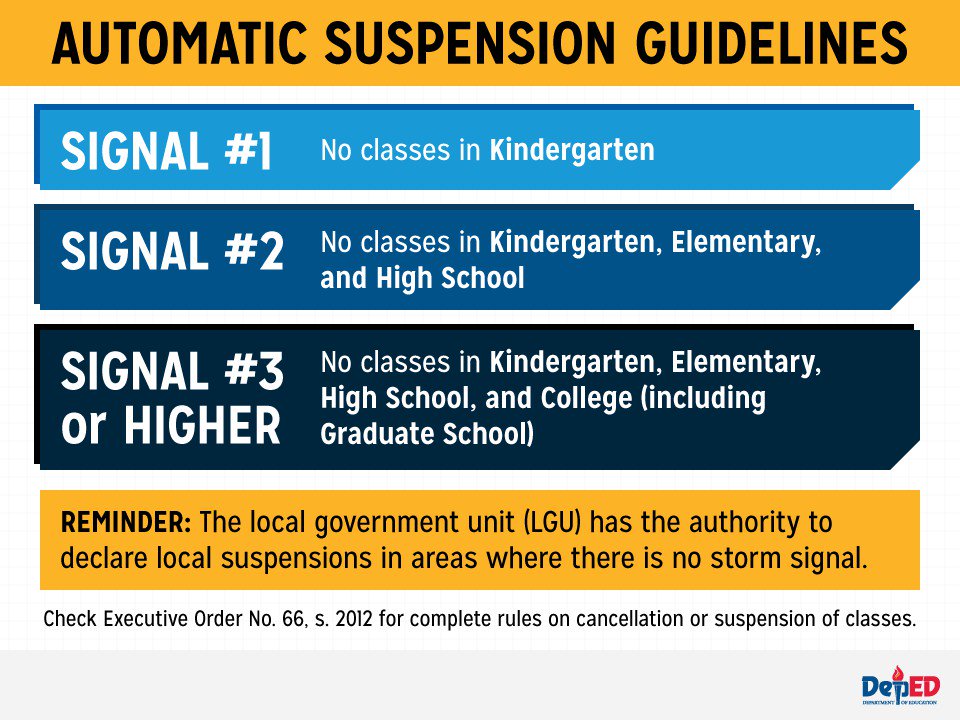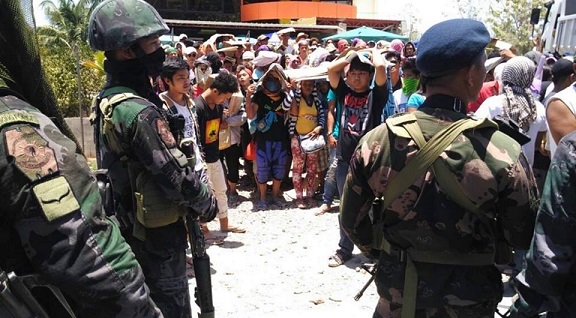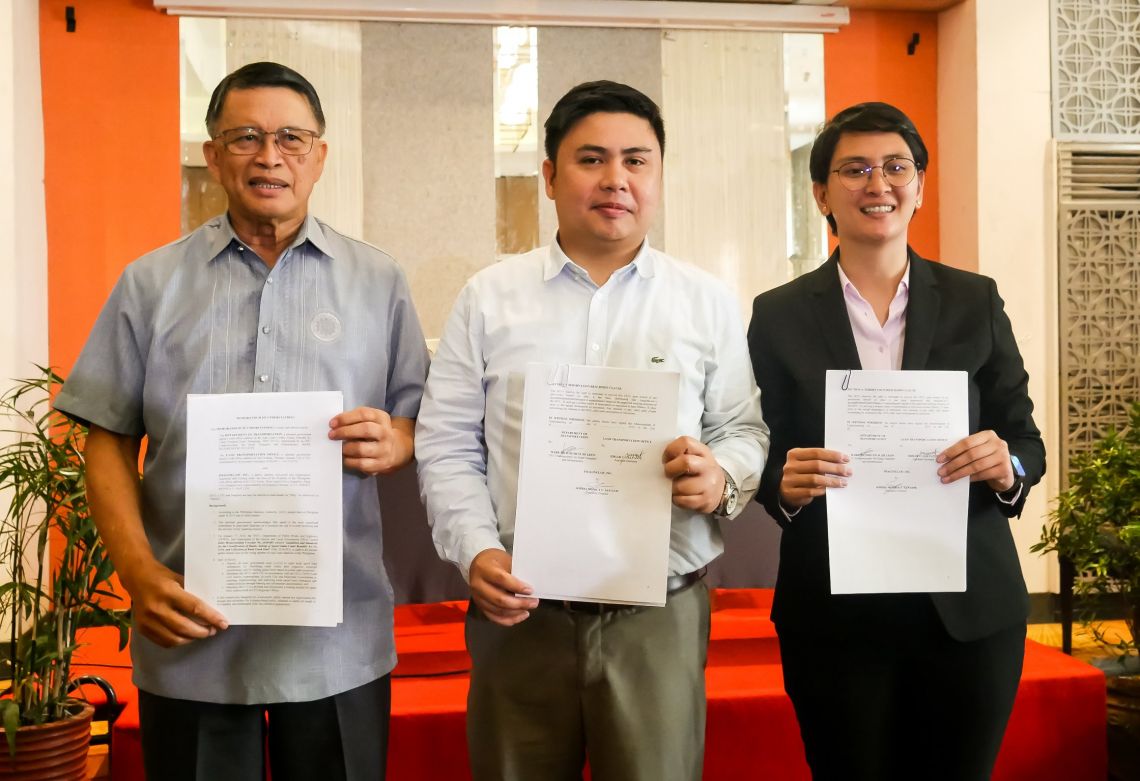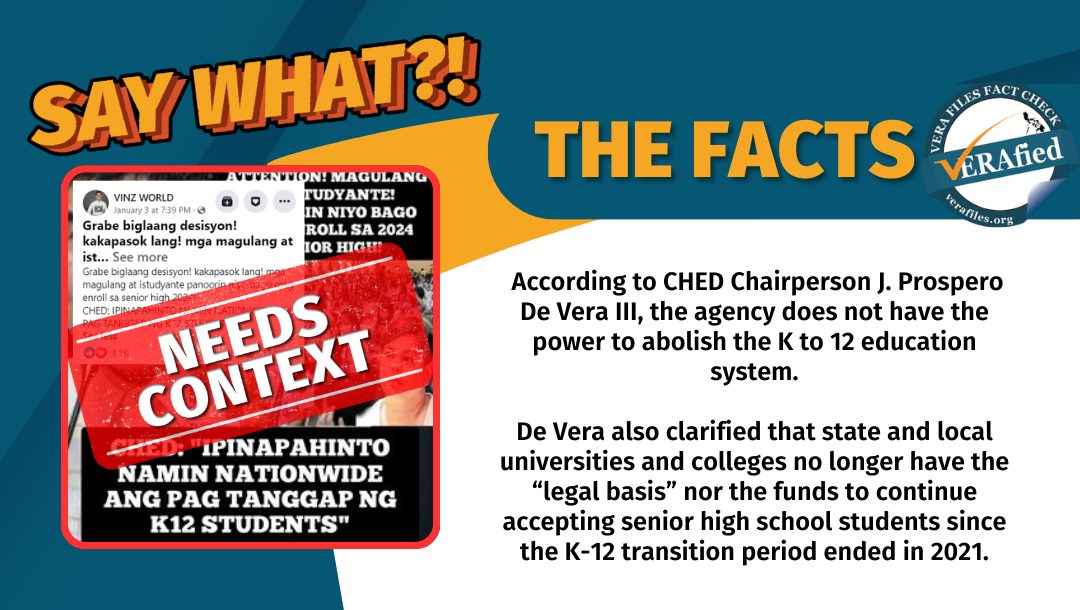Early this month, Manila City Mayor Isko Moreno Domagoso threatened to cancel the University of the East’s (UE) permit to operate after ignoring his order to cancel classes for all levels, due to heavy rains brought by Tropical Depression Egay.
UE canceled classes only from Kindergarten to Grade 12, but not at the collegiate level.
How does cancelation or suspension of classes happen? Who are authorized to decide on this and make announcements? Can universities ignore suspension of classes by local government units?
Here are five things you need to know.
Are classes automatically canceled or suspended when there is a typhoon?
Executive Order 66, issued by then-President Benigno Aquino III in 2012, mandates the Philippine Atmospheric, Geophysical and Astronomical Services Administration or PAGASA to “observe and report the weather” and “issue forecasts and warnings of weather and flood conditions.”
Classes for specific levels are then automatically canceled depending on PAGASA’s forecast and their corresponding signals:
- Signal No. 1 or higher – pre-school level (Nursery, Kindergarten and Preparatory);
- Signal No. 2 or higher – elementary and secondary levels; and
- Signal No. 3 or higher – tertiary level, including those in graduate or advanced programs, and work in government offices with some exceptions.
When the President declares a State of Calamity upon the recommendation of the National Disaster Risk Reduction and Management Council (NDRRMC), classes in all levels, as well as work in government offices are automatically suspended in areas affected by disasters and calamities other than typhoons — such as floods, earthquakes, tsunamis, and fire.
Sec. 4 of the EO requires agencies directly involved in disaster risk reduction and management to maintain their operations even in the event of cancelation or suspension of work. These include:
- the Office of the Executive Secretary;
- Department of National Defense;
- Department of Interior and Local Government;
- Department of Social Welfare and Development;
- Department of Science and Technology;
- Department of Health;
- Department of Public Works and Highways;
- Department of Education; and
- Other agencies whose operations the president or the NDRRMC deem necessary.
The heads of these agencies determine which among their respective divisions or units must continue operations.
Can classes be canceled or suspended even if no typhoon signal has been raised?
Classes and work in government offices, “specifically in flood-prone or high risk areas,” may still be canceled or suspended even if there is no typhoon signal raised, depending on the discretion of local chief executives, according to EO 66.
Who can declare the cancelation or suspension of classes?
Local chief executives decide on the cancelation or suspension of classes and are responsible for making announcements, based on the executive order. Republic Act (RA) No. 10121 or the Philippine Disaster Risk Reduction and Management Act classifies city/municipal mayors and provincial governors as local chief executives.
However, a memorandum order (MO) issued by the Commission on Higher Education (CHED) in 2012 also gives authority to Higher Education Institutions (HEI) to cancel or suspend classes at the tertiary level:
“Classes at the collegiate level, including graduate school, may be canceled or suspended at the discretion of local chief executives and/or HEIs if special circumstances in their area such as flooding, road damage, etc., warrant it.”
Source: Commission on Higher Education, MO 15, s. 12
The memorandum order says that local chief executives or HEIs shall make the announcement for cancelation or suspension of classes not later than 4:30 a.m. of the day it is to take effect, and not later than 11:00 a.m. for midday suspension.
Announcements shall be made using available media platforms such as radio, television, short message service (SMS), official websites, and social media accounts, among others.
Following Domagoso’s threat to UE, CHED Commissioner Prospero de Vera III told Philippine Star that he is urging local government units (LGU) and HEIs to develop protocols in suspending classes due to weather disturbances.
Department of Interior and Local Government (DILG) Undersecretary and Spokesperson Jonathan Malaya told VERA Files that while both the LGU and the school can suspend classes, “when the LGU has already made the decision, all schools in his jurisdiction must follow.”
Can students choose not to attend classes during typhoons or other weather disturbances even if no typhoon signal has been raised or no cancellation/suspension announcement has been made?
According to the CHED memorandum, students who were not able to attend classes or participate in scholastic activities such as examinations due to weather disturbances “shall be given consideration and be allowed to make up for the missed class or activity.”
Can local chief executives cancel school permits for ignoring their order to suspend classes due to inclement weather?
“The Mayor’s Permit to Operate is not a right but a privilege and may be revoked by the LGU concerned for violations of laws, ordinances, rules, and regulations which include [EO 66],” Malaya said.
This is in accordance with RA 7160 or the Local Government Code of 1991, which states that local chief executives may:
“issue licenses and permits and suspend or revoke the same for any violation of conditions upon which said licenses or permits had been issued, pursuant to law or ordinance.”
But Malaya stressed that in such cases, due process must be given “by issuing a notice of violation and giving [the school] an opportunity to explain before the permit may be validly revoked.”
In a 2018 legal opinion, the DILG weighed in on the regulatory power of a municipal mayor in issuing cease and desist orders against licensed entities in its territorial jurisdiction. The document cited Supreme Court decision G.R. No. 111397:
“The regulatory powers granted to municipal corporations must always be exercised in accordance with law, with utmost observance of the rights of the people to due process and equal protection of the law. Such power cannot be exercised whimsically, arbitrarily or despotically.”
Source: Department of Interior and Local Government, DILG Opinion No. 76, s. 2018, Nov. 28, 2018
Sources
Inquirer.net, Manila mayor threatens to revoke UE permit for failure to suspend classes, July 1, 2019
CNN Philippines, Manila Mayor calls out university for ‘circumvention’ of class suspension order, July 1, 2019
Philstar.com, Isko warns UE for ignoring class suspension, July 2, 2019
Official Gazette, Executive Order No. 66, Series of 2012
Official Gazette, Republic Act. No. 10121
Commission on Higher Education, Memorandum Order No. 15, Series of 2012
Department of Education, Department Order No. 43, Series of 2012
Philstar.com, Agree on class suspension protocol, HEIs, LGUs urged, July 4, 2019
Official Gazette, Local Government Code of 1991
Department of Interior and Local Government, DILG Opinion No. 76, Series of 2018
Supreme Court of the Philippines, G.R. No. 111397
(Guided by the code of principles of the International Fact-Checking Network at Poynter, VERA Files tracks the false claims, flip-flops, misleading statements of public officials and figures, and debunks them with factual evidence. Find out more about this initiative and our methodology.)





